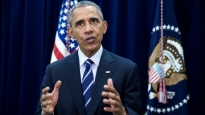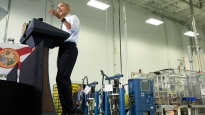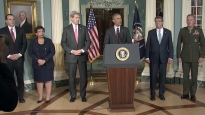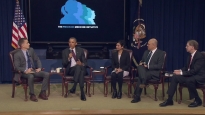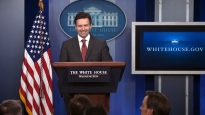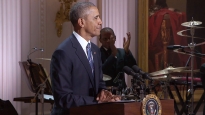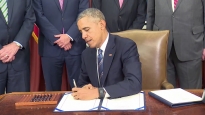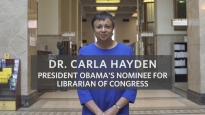Press Briefing
April 15, 2014 | 52:19 | Public Domain
White House Press Briefings are conducted most weekdays from the James S. Brady Press Briefing Room in the West Wing.
Press Briefing by Press Secretary Jay Carney, 4/15/2014
James S. Brady Press Briefing Room
12:36 P.M. EDT
MR. CARNEY: Good afternoon, ladies and gentlemen. Thank you for coming. I have no announcements at the top, so we'll go straight to your questions.
Julie.
Q Thanks, Jay. I just wanted to start by stating for the record our request that you open up the President’s moment of silence for the Boston bombing to a full pool. It's clearly a newsworthy anniversary and we think it's appropriate to have independent media coverage of the President marking that anniversary.
MR. CARNEY: Well, the President is going to have a moment of silence in the Oval Office. There will be some senior advisors there. It's during the course of a meeting. We certainly think that the moment is important, but it is mostly important in Boston. And I appreciate the request. As you know, I think, Julie, and if not I'll tell you now, there has been an occasion in situations like this when we have suggested that a single photographer could come, representing the independent media and pool it, and that has been rejected by your news organization and others because they don't like the competitive disadvantage. So that goes to one side of the argument, but not the one that has to do with access of the free press.
Q So there’s two hours left, so I'll still ask that you think about that request.
If I could move on to the situation in Ukraine -- the Ukrainian military appears to have started operations to try to push back pro-Russian forces. Is the U.S. supportive of the actions the Ukrainian government is taking right now?
MR. CARNEY: We understand the government of Ukraine is working to try to calm the situation in the east and note the measured approach of the Ukrainian security forces thus far. As you know, the Ukrainian government has repeatedly sought to negotiate with the armed groups that have seized public buildings and established unauthorized roadblocks in eastern Ukraine in an effort to resolve the situation peacefully through dialogue. Ukrainian officials have even offered amnesty to those occupying the government buildings.
We appreciate the government’s statements that any actions it undertakes will be gradual and responsible, and we agree that the use of force is not a preferred option. That said, the Ukrainian government has a responsibility to provide law and order, and these provocations in eastern Ukraine are creating a situation in which the government has to respond. The best way to deescalate the situation is for the armed militants to leave the buildings they have seized.
I'd also note that we strongly support the government’s efforts to move forward on constitutional reform, on elections, and on decentralization, which can help unify the country and provide a constitutional, legal mechanism for people to make their views known.
Q Obviously Brennan and other U.S. officials have been in touch with Ukrainian officials. Has there been any coordination or assistance or advice to the Ukrainians as they carry out these operations?
MR. CARNEY: We have been, obviously, in regular consultation with Ukrainian government officials and we have been actively supporting the Ukrainian government in its efforts to right the Ukrainian economy. We have, just yesterday, moved forward in signing an agreement that would provide a billion dollars in loan guarantees to Ukraine. And we have counseled restraint in the handling of this crisis by the Ukrainian government, and we have been admiring of the restraint that the Ukrainian government has shown.
And we urge the Ukrainian government to move forward gradually, responsibly, and with all due caution as it deals with this situation caused by armed militants who have seized government buildings, established roadblocks illegally in parts of the country, in some cases, paramilitary groups, men dressed in ski masks and some of them in armored vests carrying fairly heavy weaponry. So this is not -- these aren’t peaceful demonstrators we're talking about, unfortunately.
And yet, Ukraine has proceeded with great caution, has for days now, been offering amnesty, dialogue, has been trying to resolve these conflicts peacefully. And we continue to counsel restraint but absolutely understand that the dynamic created by these coordinated seizures of buildings in eastern Ukraine has become somewhat untenable for the lawful government of Ukraine.
Q Finally, in the readout of the President’s phone call with President Putin yesterday, the White House says that Obama -- that while a diplomatic option is still open, that can’t succeed as long as Russia is engaged in its current behavior. So why have these talks in Geneva this week if Russia doesn’t change anything over the next couple of days?
MR. CARNEY: Well, we continue to engage with Russia at the level of the two Presidents, at the Foreign Minister level, and we will participate in the meeting on Thursday between the Russian and Ukrainian governments, the United States and the EU.
Q But are you essentially acknowledging that those talks are going to fail if --
MR. CARNEY: We will continue to make the case to Russia that it is important to pursue a path of deescalation rather than support for these separatist groups, both direct and indirect, because it is simply the case that the future of Ukraine must be decided by the Ukrainian people and cannot be negotiated or decided over the heads of the members of the Ukrainian government.
That’s why it’s important that this meeting include representatives of the Ukrainian government. One of the key elements of the proposal that we’ve urged upon Russia is that they take the step of engaging in direct dialogue with the Ukrainian government. So the meeting is an opportunity for that to happen. Obviously, the United States and the European Union are participating.
But we think it’s important to make clear again that there is a path that Russia can pursue here that will allow the situation to deescalate, that will allow for the fair evaluation of concerns that Russia says it has about the rights of ethnic Russians in eastern Ukraine, and will allow for a process that the Ukrainian government itself has endorsed around decentralization to move forward.
And I think that, again, the Ukrainian government has demonstrated enormous restraint and reasonableness when it comes to acknowledging that there need to be reforms that allow for those in regions away from the center, away from Kyiv, to feel that they’re being properly represented. But this all has to happen with the active participation of and consent by the Ukrainian people and the Ukrainian government.
Q The Russian Prime Minister says Ukraine is on the verge of a civil war. Why is that not a fair assessment?
MR. CARNEY: There is a crisis in Ukraine and you have armed paramilitary groups seizing buildings, blockading key roads, and that is a dangerous and volatile situation to have. It is precipitated by obviously Russian separatists, or pro-Russian separatists in Ukraine and supported by, both directly and indirectly, Russia. And that’s a very dangerous situation. And that is why we have called upon Russia to cease its support for these actions and to instead engage in a dialogue with the Ukrainian government, to pull back its forces from the border, the presence of which in and of itself is destabilizing, and to allow the Ukrainian government to move forward in the manner that it has said it wants to move forward when it comes to elections and constitutional reform and decentralization. That's the proper path here. But there’s no question that this is a dangerous situation and a volatile situation.
Q Are you changing your view about military aid to Ukraine? Are you still opposed to it? And if so, why?
MR. CARNEY: With regard to any potential military assistance, Steve, we don't have any announcements to make today. Our main focus continues to be on supporting economic and diplomatic efforts to deescalate the situation. As the President has said, we do not see a military solution to this crisis.
This is actually not that complicated to resolve if Russia would agree to engage with the Ukrainian government, would agree to pull back its forces, would stop supporting pro-Russian separatists who have seized buildings by force. There’s a way forward here that can ensure that the rights of ethnic Russians in eastern Ukraine are protected, that the long historical and cultural and economic ties that exist between Russia and Ukraine are maintained appropriately, even as Ukraine and the Ukrainian people decide for themselves what the nature of Ukraine’s relationship with Europe will be and what the nature of Ukraine’s relationship with Russia will be.
So that's the only resolution to this crisis. There’s not a military solution -- there certainly should not be one. And that is why we are urging those armed separatists to vacate the buildings that they’ve occupied and to allow a process to move forward whereby elections can take place, reform can take place, and decentralization can take place.
Peter.
Q On that point, Wes Clark has done this report apparently on whether or not certain equipment that could be provided the Ukrainians that is not lethal -- like Kevlar vests and aviation fuel and night-vision goggles -- could be provided, but the government apparently is against providing that because it’s considered to be a force multiplier. Could you talk about why the U.S. government wouldn’t want to provide defensive equipment like that?
MR. CARNEY: Well, I can say that we’re not considering lethal assistance. We are obviously evaluating requests and looking at ways that we can support the Ukrainian government, but our focus is on continuing to put pressure on Russia so that it understands that the international community is united when it comes to support for Ukraine’s sovereignty and territorial integrity and that there is a path for Russia to take that would deescalate the situation, ensure that it doesn't devolve into violence, and that would allow for the rights of ethnic Russians to be protected and evaluated and assessed by international observers. That's our focus right now.
I just don't have any new information to provide today about forms of assistance that we’re considering, except to say that we have -- we’re not discussing lethal assistance.
Q Do you consider body armor and night-vision goggles and stuff like that to be lethal then? Or is that something that --
MR. CARNEY: I don't want to parse forms of assistance -- I think that people understand what lethal assistance is. But I don't want to -- I just don't have anything more to say about what kinds of assistance has been requested or what we’re considering.
We are focused right now on providing the economic assistance that the Congress and the administration have worked together to secure for Ukraine and to provide the diplomatic effort that we’re engaged in, including with the meeting in Thursday.
Michelle.
Q I’m sorry, did you just say that you’re not considering lethal assistance?
MR. CARNEY: It’s not currently something that we’re considering, to provide lethal assistance.
Q Okay. And when he said night-vision goggles, you’re not specifying what is --
MR. CARNEY: I’m not going to get into a “what counts” as that. I think there’s a certain obviousness to what counts at lethal and nonlethal assistance, but I’m not an expert in the field, so I’ll leave that to the experts.
Q Moving on from there, on the call yesterday, how long did it last?
MR. CARNEY: I don't have the exact time here I don't think. I know it was fairly long. Obviously --
Q Would you say longer than an hour?
MR. CARNEY: Again, I don't have -- we’ll get an exact time for you. It was a fairly lengthy discussion, as has been the case as a rule in conversations between Presidents Obama and Putin. You have to, of course, be mindful of the fact that translation is involved, so that makes calls longer.
Q And because it was Russia that reached out to the U.S. in this case, would you say that there was any nugget of progress in this call? What is the common ground, if any?
MR. CARNEY: We put out a fairly detailed readout of the call and the topics of conversation and the views that the President expressed. It is certainly the case that we have not yet seen from Russia a decision to stop supporting separatist pro-Russians in Ukraine, and we have not seen Russia make the decision or act on the decision to remove the extensive number of troops that they’ve placed on the Ukrainian border.
Our views, however, have been expressed very clearly and directly to President Putin and Foreign Minister Lavrov and others, and those are not our views alone. We are speaking with one voice on this matter with our European allies and partners, and will continue to do that. And I think you’ll see that kind of coordination on Thursday at the meeting, the so-called contact group meeting.
What I think is also true is that Russia understands that they have already incurred costs because of their decision to flout international law by occupying and attempting to annex Crimea, and that those costs will grow as Russia continues to engage in provocative actions, and that we are prepared, because of the authorities that we have in the executive orders the President signed, to escalate sanctions and other costs if and when Russia escalates its actions.
Q Well, I guess progress-wise or any common ground -- the fact that Russia is going to be at the talks and at least gives lip service to a diplomatic window, would you consider that to be legitimate on their part?
MR. CARNEY: We think it’s important for Russia to engage in a dialogue with Ukraine, for the Russian and Ukrainian governments to work out together some of the issues between them, fundamentally, because it is only for Ukraine and the Ukrainian people to decide their own future.
No outside country -- not the United States, no other country in Europe, not Russia, certainly -- has the right to or is in a position to dictate to Ukraine what Ukrainian’s political structure ought to look like, how its democracy ought to function. That is for the Ukrainian people to decide. So we have insisted all along that these kinds of talks have to include as a primary participant the Ukrainian government. And that is certainly the case this week.
So we certainly hope that Russia will avail itself of the option to pursue a path of deescalation. We'll hear from Ukrainian officials the fact that they have pledged to pursue constitutional reform, pledged to pursue decentralization, have already called for and are implementing an election process that will lead to elections on May 25th, which will allow for an opportunity for everyone in Ukraine to vote for their representatives freely. And that’s how it should be.
Q The administration supports what they’re doing now, I guess you would call it militarily, moving troops that the administration --
MR. CARNEY: What I said is that we have urged restraint upon the Ukrainian government and have noted that they clearly do not consider the use of force a preferred option. They have been placed in a very difficult situation by the seizure of these government buildings and the blockade of roads by armed militants. But we call on Ukraine to proceed gradually and responsibly, as they have done, in order to limit violence in this situation.
But let’s be clear that the way to ensure that violence does not occur is for these armed paramilitary groups and these armed so-called pro-Russian separatists to vacate the buildings and to lay down their arms. The Ukrainian government has moved forward since it came into place to have these irregular militias and other groups, both Ukrainian nationalist groups and pro-Russian groups, to disarm and to cease any kind of activity that is inconsistent with the law. And that is certainly appropriate in this case.
Q Can I follow on that, Jay?
MR. CARNEY: Sure, Scott.
Q Thanks, Jay. Again, the idea of no military solution to this situation -- and this is the Ukrainian government’s military response. You’ve outlined why that’s clearly their right to do. But I’m wondering, when you say no military solution, do you mean no military solution involving the United States or NATO, or just any military solution at all?
MR. CARNEY: Well, I certainly don’t think -- we don’t think that there’s a military solution to this crisis. This is a situation that needs to be resolved diplomatically and through dialogue and negotiation. And that’s true internally within Ukraine and true in terms of Ukrainian-Russian relations. There’s certainly no appropriate military solution to this conflict.
So the action that Ukraine is taking is one that we hope and at least thus far are seeing is gradual and responsible and limits violence. It’s one that is not their preferred option. It’s one that has come after many days of efforts to negotiate a peaceful resolution to these situations. The offer of amnesty, the request for dialogue, the very, I think, strong statements by Ukrainian government officials in support of decentralization and constitutional reform -- these I think demonstrate and prove the Ukrainian government’s intentions here and their restraint.
So my point is that Ukraine obviously has been put in a situation where they, in order to maintain law and order, have to act, but have to act responsibly and gradually. But the issues between regions of the country in the center and between ethnic Russians and ethnic Ukrainians need to be resolved through a process of negotiation, dialogue, constitutional reform, governmental reform. And those are things that the Ukrainian government has pledged itself to pursue. And that’s very important. So the answer to that should not and must not be violence.
Q You’ve used -- this is the position that the administration has also taken with Syria. And I’m wondering if when you look at Syria and you see one side in that conflict, the government side, clearly seeing a military solution to what is happening in the country, and the other side being supported by the United States and others in a position of not seeing a military solution, the United States not getting more involved in supplying weapons directly, those sorts of things, are there lessons to be learned from that? And is there a danger that in this case --
MR. CARNEY: I think these are quite different situations. I think that the connective tissue that you’ve established has to do with our view that in Syria there’s not a military solution to that conflict. In other words, it doesn’t get resolved through fighting. President Assad will never again rule all of Syria; he will never again have the support of all of the Syrian people. And that situation has to be resolved through a negotiated political settlement, and that’s what we’ve supported. This is obviously -- it’s certainly true we do not see a military solution to the current crisis in Ukraine, but I think the dynamics are a little different.
Q I’m more asking about the challenge of one side seeing a military solution perhaps and the other side not, and the result of that being a volatility that increases in violence and increases rather than that then is a solution. And I know that they’re a bit different, but --
MR. CARNEY: Well, I suppose that the purpose of diplomacy and the kinds of actions that we and our partners have taken is not to accept the world as it is, but to try to move the world closer to the way it should be, conflict by conflict. And in this case, absolutely, Russia has not moved its troops away from the border, but it should. Russia has not chosen the path of deescalation, but it absolutely should. And we are acting with our partners and allies to make clear to Russia that the cost of their chosen path is isolation and harm to their economy and that those costs will increase as long as Russia pursues that path. And I think that’s absolutely the right approach to take.
Bill.
Q There is talk of new sanctions to be announced today. Will there be?
MR. CARNEY: I don’t have an update on any action that we might take in that arena. We are certainly evaluating potential new actions and when we have an announcement to make we’ll make it.
Q Could it come as early as today?
MR. CARNEY: I’m just not going to speculate about what may or may not happen, except to say, as I did yesterday, that we’re actively looking at our options. And I think it’s important to note that we have the capacity because of the authorities the executive orders established to impose sanctions at a variety of levels with different impacts and scope, and that we will avail ourselves of that ability to escalate in response to escalation. And that’s the kind of -- that’s the view that we’re taking as we evaluate our options both here in the United States and, most importantly, in coordination with our partners.
Q I would think the curiosity is whether you would wait until there’s actual movement of Russian troops, or whether you would do it in response to the uprising --
MR. CARNEY: Well, again, I think that that suggests that there’s only one action we can take. And the fact is the authority that we have under the executive orders allows for a variety of types of sanctions and actions and with greater degrees of scope and impact, depending on what we might be responding to and what action Russia might take.
I think it’s also fair to say -- you didn’t ask this, but we are watching the situation very closely in Ukraine and we are looking forward to this meeting on Thursday to see whether or not there is the potential anyway for moving forward on a diplomatic resolution and deescalation, which, as you know from our readout of the President’s call with President Putin, is something that we are still pressing upon the Russians.
Q So you would wait until Thursday?
MR. CARNEY: Again, I’m not going to speculate about when we may have an announcement on further sanctions. It is absolutely safe to report that we are evaluating our options and considering quite seriously next steps when it comes to sanctions. But I don’t have an announcement today.
Q Just to circle back for a second to military aid, you didn’t seem to rule it out.
MR. CARNEY: Right, I just don’t have an announcement to make on the kind of assistance that’s been requested or the kinds of things that we might consider. Our focus is on the kinds of actions we’ve taken both diplomatically and through the leveling of sanctions.
Q So, conceivably, you could supply the kind of aid that was just discussed here?
MR. CARNEY: Again -- I mean, you could say things are conceivable, but what I have not said in any way, with any detail, what is under consideration beyond the caveat that I offered about lethal assistance.
Jim, and then Kristen.
Q Since the Russian storyline has been that the CIA has been orchestrating the Ukrainian unrest on the Western side, was it a wise idea to send the CIA Director to Ukraine over the weekend? Was that wise to do?
MR. CARNEY: An assertion of fiction doesn’t hold water regardless of who we send or who visits Ukrainian government officials. The implications that Russians have made associated with that visit is -- how does that make sense when we have meetings and consultations at that level and between the intelligence services of the United States and Russia, as well as many other countries?
So one of the fascinating things to watch, I think for many of us, especially those of us who have some experience with the former Soviet Union and Russia, is the kind of propaganda efforts that have gone into -- have been an aspect of this situation in Ukraine, some of them remarkably heavy-handed. I mean, we talked about yesterday the paramilitary with their uniforms as they had in Crimea but stripped of insignia, the kind of unbelievable assertions -- unbelievable in the sense that nobody believes them, but they’re made anyway.
I think it’s worth noting that the U.N. released a report today -- and I’d like to draw your attention to it -- and that report notes deep concerns about the human rights situation in the Crimean region of Ukraine, and it also found that ethnic Russians in eastern Ukraine have falsely claimed to be under attack in an attempt to justify Russian involvement in Ukraine. Specifically, the report found that attacks against ethnic Russians “were neither systematic not widespread.” But that was and has been a pretext for stated Russian concerns, Russia’s support for pro-Russia separatists. And most of the world is not buying these kinds of propaganda. But they are what they are.
Q Certainly for the impartial observer it’s pretty easy to see that Russia is indeed supporting these militias you speak of. But don’t you add credence to some of their assertions, not about Russian citizens or ethnic Russians being attacked, but about the start of the unrest there when there was an uprising when the Russians have been blaming that uprising all along on the CIA, and then we send the CIA Director there at this particular time?
MR. CARNEY: But I think -- Jim, I think it’s important for everyone who reports on this to apply their critical faculties to that kind of assertion. There is no factual basis for those assertions -- zero, none -- because they’re not true. And what is true is what many of your news organizations have been reporting about what’s been happening on the ground in Ukraine, the nature and makeup of the paramilitary groups that have taken action in Ukraine, the support that Russia has given indirectly and directly to those efforts, the presence of Russian intelligence agents and others -- military, apparently, according to independent media reports -- in Ukraine, the presence -- undisputed presence -- of tens of thousands of Russian troops on the Ukrainian border. Those are incontrovertible facts. And I think it's important to separate them from baseless assertions.
Q If I could, just on one other subject matter and that is on the immigration meeting, the faith-based meeting that just happened. At the stakeout just a few moments ago, those leaders said that the President said that he was not on the verge of making any independent executive action. Is that a change from what he just recently asked the Director of Homeland Security to look at ways that he could make some changes?
MR. CARNEY: First of all, I’m not going to read out the private conversations of the President. But the action that the Secretary of Homeland Security is taking at the President’s request is happening and is a review of practices and the implementation of enforcement guidelines. I think that’s separate from the kind of thing that you’re talking about. Again, without reading out private conversations that the President has had, I think the President believes that there is an opportunity that still exists for House Republicans to follow the lead of the Senate, including Republicans in the Senate, and take up and pass comprehensive immigration reform.
And today’s meeting that the President had with faith leaders demonstrates and reinforces the fact that there is a broad -- unusually broad coalition that supports that effort, that supports comprehensive immigration reform, and all the benefits that making reform the law would provide to the country -- to our security, to our economy, to our businesses. And that support includes many in the faith community, and it includes those in business, those in law enforcement. It includes -- the coalition is broad and disparate and it is not the kind of coalition that you see come together very often in Washington. And I think it highlights the isolation that House Republicans find themselves in when so many not just politicians or advocacy leaders but folks across the country support doing the right thing here.
And the irony, of course, is that there is a really strong conservative argument to be made on behalf of comprehensive immigration reform. And there’s also a strong political argument. It’s not one that I necessarily see as in the interest of the Democratic Party to make, but it is a fact that the Republican Party would benefit from dealing with this challenge. And I’m only quoting numerous Republicans who have said so.
The President is focused only on doing the right thing for our country, doing the right thing on this very difficult issue, and allowing everybody, but most importantly, the country and the economy to benefit from taking action.
Kristen.
Q Jay, thanks. Some lawmakers are arguing that if there were to be new sanctions, that they should include sanctions on Putin’s own financial assets. Is that under discussion right now?
MR. CARNEY: Kristen, I am not going to go through a list of the kinds of things that are under consideration with any specificity except to say that we have broad authorities under the executive orders that the President signed to level sanctions. We are coordinating directly with our European partners and others on these issues. You’ve seen a great deal of unity in this effort both in the condemnation of Russia’s actions in Ukraine and in the imposition of costs on Russia in response to those actions.
Q Without getting specific, can you say if that is off the table?
MR. CARNEY: Without getting specific, could I be specific? No. I’m not going to get into individual proposed sanctions and whether or not they are actively under consideration except to say that we are actively reviewing potential sanctions. And we’ll certainly let you know if and when we take action in that arena.
Q Some lawmakers, some experts in the region say sanctions should go into effect immediately, should have already gone into effect. What do you say?
MR. CARNEY: Sanctions have gone into effect.
Q Well, another round.
MR. CARNEY: Well, we are coordinating very closely with our European partners and allies. I think that it is safe to say that we are -- in this matter, the impact of what we do is enhanced when we work in a coordinated way with our partners. That has been the case thus far. It was certainly the case coming out of the President’s meeting -- a series of meetings in Europe on his trip there and the run-up to those meetings. And it has been the case since then. There are numerous statements that I could point you to from European leaders that emphasize the point that what Russia has done is unacceptable, A; and, B, and that there have be costs for this kind of violation of Ukraine’s sovereignty and territorial integrity, and that those costs will increase if Russia takes further action up to and including obviously sending troops into Ukraine. And we obviously couldn’t agree more with our partners on this and are coordinating with them closely.
Q I wanted to go back to Ukraine’s actions and try to follow up there. To what extent is the President concerned that this anti-terror campaign could actually give Putin the excuse that he’s looking for to invade and to say that he’s doing it under the guise of defending the pro-Russian separatists?
MR. CARNEY: There’s no question that the playbook that Russia is employing includes that play. We’ve seen it before. And some of the provocations and pretexts that we’ve seen come straight out of that playbook. What we have seen in the Ukrainian government’s response is enormous restraint and recognition of the fact that force is not the preferred option in dealing with this. That’s why the Ukrainian government has offered amnesty. That’s why the Ukrainian government has urged dialogue and peaceful resolution to this crisis.
But it also certainly the case that when you have armed paramilitary groups seizing buildings and blocking roads and they will not vacate those buildings or unblock the roads, that it places the Ukrainian government in a very difficult situation and they, understandably, believe they need to take action. What we urge is that that action be gradual and responsible and that it limits violence as much as possible.
Q And just one on Syria. You said yesterday that the administration is aware of the reports. Do you have a timeline for when you might be able to confirm one way or another? Can you update us on that process?
MR. CARNEY: Well, I can tell you that we are still looking into those reports, but we are not able to corroborate them and those claims at this time. Corroboration depends on many factors, as you know. And we’ve seen in the past that -- I think the IC, the intelligence community can give you a fuller picture of how that process works, but we don’t have any confirmation today.
Q You don’t have a timeline for when you might?
MR. CARNEY: No, I don’t.
Roger.
Q Ukraine says that there are elements of Russian special forces identified in the anti-government groups. Does the U.S. have any evidence of that, or do you know?
MR. CARNEY: Well, we’ve certainly seen substantial evidence to suggest direct Russian involvement, including media reports, including one I saw this morning where one of the individuals seizing a building identified himself as a lieutenant colonel in the Russian army, and I think the Ukrainian government has noted that they have arrested a number of Russian agents. But I would refer you to the Ukrainian government for details.
Q I want to ask you about -- Mike McFaul this morning on MSNBC was saying that if Ukraine proceeds with its offensive, which it now seems to be, he says it’s going to be “a very, very bloody,” a “dangerous moment that I think could then precipitate Russian involvement later.” What do you make of those comments?
MR. CARNEY: Well, that’s basically the same question I got from Kristen and it’s in many ways consistent with some of the questions I’ve gotten already in the briefing. The answer to that is Ukraine needs to and has been thus far demonstrating restraint and caution and moving forward gradually and in a responsible manner in dealing with a very difficult situation.
But it is also understandable that in a dynamic like this where you have armed paramilitary groups seizing and occupying government buildings and you have paramilitary groups blockading roads, that at some point the Ukrainian government has to take action to assert law and order and to protect its citizens. But it has pledged itself to -- and we certainly support the effort -- to take that action in a responsible and gradual manner.
Yes, sir. Oh, and then -- sorry, Carol.
Q Senator Murphy, a Democrat, as you know, said yesterday in a statement that based on everything that Russia has done up until this point that the United States should be operating under the principle that they’ve decided to invade. Is that the principle under which you guys are approaching this at this point? Do you agree with that statement?
MR. CARNEY: I didn’t see that specific statement. I think that Russia hasn’t invaded, I can’t speak to their motivations or their plans. But we are obviously very concerned about the presence of Russian troops in large numbers on the Ukrainian border. That presence has been there for some time now and has been a concern for some time, and such a move would be a dramatic escalation of this crisis and would be responded to I think quite strongly by the United States and our allies.
Q And two other quick things. Is there any consideration to the President postponing his trip to Asia next week since we’re --
MR. CARNEY: I don’t have any scheduling changes to make or announce.
Q And then to follow on Julie’s question about the moment of silence the President is going to be observing, can you just clarify why you guys did not -- do not want reporters in there to observe the moment of silence? Because we’ve had access to other moments of silence, particularly on 9/11, since he’s taken office.
MR. CARNEY: Well, the one on 9/11 was outside -- has been, traditionally, outside. This is a meeting in --
Q But you guys can schedule these things wherever you want them to be, in whatever room you want them to be.
MR. CARNEY: This is in the course of a meeting that he’s having in the Oval Office.
Q Right, but why was that made -- why was the decision made to have it there, as opposed to having it in a space where we could have access -- where you didn’t then come to us and say, well, it’s in the middle of a meeting? Because you do that.
MR. CARNEY: Well, you could say that about any -- why don’t we have Cabinet meetings outside and you guys can attend in full, or national security meetings in the briefing room.
Q -- we could attend in the Map Room -- because the pool has access to a lot of different rooms.
MR. CARNEY: But I mean, I guess the point is the President is having a moment of silence; it’s in the Oval Office. It’s his personal commemoration with a handful of advisors of the tragedy that happened in Boston and the resilience that the people of Boston showed in reaction to it.
Q And you guys don't want us to see that? Or I don't -- I’m trying to understand what’s behind this.
MR. CARNEY: It’s a quiet moment in the Oval Office. As I noted to Julie, in that setting we have in the past offered to have a single photographer from the news media, much in the way that poolers from the print media pool for the rest of the press -- a single photographer can come in and pool for the rest of the photographic media. And that offer has been rejected.
Q Well, with all due respect, Jay, that's a very rare occasion. And these types of news events are -- you guys have been able to accommodate -- I mean, the pool in general is not a large --
MR. CARNEY: With all due respect, I think the news is in Boston today on this issue.
Yes, sir.
Q On the Obama-Putin call, it’s described as “frank” in your statement. And we get the word “frank” with a lot of calls that the President makes with world leaders. Let me try to dig a little deeper in that -- how firm was it? Was there a sense of tension in this call? If you put aside the blasé translations, were there raised voices?
MR. CARNEY: I don't think the translations are necessarily blasé. Look, I think we gave a pretty detailed readout of the call, including the very clear objections that the President expressed about Russian support for the kind of activity we’ve seen in eastern Ukraine involving armed groups seizing buildings, occupying, blockading roads, and making the point again to President Putin that the better path is for Russia to work with the Ukrainian government and the international community to deescalate the situation and to engage on this matter in a way that prevents it from getting worse and getting violent or more violent. And I think it was -- “frank” is obviously a term of diplomatic art, but I think it represents a very clear enunciation by the President, clear and firm, of our views and our concerns, as well as our belief that there is still a path available to Russia to join with us and the Europeans and the Ukrainians to resolve this peacefully.
Q Raised voices?
MR. CARNEY: I think that these leaders speak and air their differences with some frequency so I think “frank and firm” is the best way to describe it.
Yes.
Q Regarding the commuted sentence that was announced earlier today, is there a flaw with the system if the President has to get involved to fix a typo?
MR. CARNEY: Well, I’m not the proper person to ask about these kinds of things that happen in our judicial system, but in this case, the President did act quickly to commute the sentence of Cesar Cantu because he was mistakenly sentenced to an additional 42 months or three and a half years, in prison based on a typographical error.
I don’t know all the details of how that came about. He pled guilty in 2006 to charges related to drug trafficking and money laundering. There was a typographical error in Mr. Cantu’s pre-sentence report that increased his sentence. A judge ruled that Mr. Cantu did not discover this error in time to correct it through any judicial means. As a result, it can now only be rectified through clemency. The President thought it was the right thing to do to commute his sentence.
Q Can you tell us how that came to your attention? Usually when drug sentences are commuted or pardons are granted they’re done in batches at certain times of the year.
MR. CARNEY: Sure. I mean, obviously the process works -- even though Presidents, this President and others, tend to act on clemency in batches, but the process continues I think throughout the year. And given the circumstances of this case and the manifest injustice of keeping a person in federal prison for an extra three and a half years because of a typographical mistake, the President wanted to act as quickly as possible. This is a matter of basic fairness and it reflects the important role of clemency as a failsafe in our judicial system.
Q Can you tell us when this came to the White House, how long it has been?
MR. CARNEY: I don’t have anything more specific on when this arose, but I know that when it got to the level of the President that he, on the recommendation of his counsel, acted quickly.
Q I wanted to ask, real quick, going back to the conversation you said that Ukraine and Russia need to have with each other to air out their differences -- do those differences include territorial borders of Ukraine and the status of Crimea? Is that the diplomatic solution?
MR. CARNEY: Well, what I would say to that, Jared, is that any decision about the borders of Ukraine, about the status of regions within Ukraine in relation to the center, the degree of autonomy that any region of Ukraine might have in relation to the center can only be decided and approved by the Ukrainian people through their elected representatives.
That is what was wrong with what happened in Crimea. It was an illegal seizure, an occupation of a region of a sovereign nation without the consent of the Ukrainian government, without the consent of the Ukrainian parliament, without the consent of the Ukrainian people. Any discussion about Ukraine’s territorial political status, the nature of its regions and their relationship with the center, can only be had with Ukrainian government officials and it can only be done and acted on by the Ukrainian people. That’s up to them to decide. It is certainly not for an outside nation -- Russia in this case -- to decide on Ukraine’s behalf.
Q But doesn’t Russia have a role in that discussion then if these are legitimate -- I guess, there is a level of how legitimate the claims that the Russian-speaking populations are, but if there’s a move on these Russian-speaking populations to join Russia, does Russia not then at least have a role to play in having that conversation with the leaders in Kyiv?
MR. CARNEY: What we have urged all along, and what the Ukrainian government has asked for and urged all along, is dialogue with the Russian government. The Ukrainian government has not, nor should it, and nor would we ever agree to a situation where Russia got to decide for Ukraine what Ukraine looks like and what its government looks like.
Kathleen.
Q On the commutation, it looks like the President just approved one of these petitions in his first term and now this is nine or 10, I think. Can you explain why he seems to be doing more pardons and commutations in his second term?
MR. CARNEY: I think I addressed this back when we did a number of commutations a few months ago in terms of how the process works and how he has viewed it. Again, on this specific one, it has to do with the manifest injustice of having someone serve an additional three and a half years because of a typo.
Q The timing of these things?
MR. CARNEY: I’ll have to refer you to what I said and others said back when we had the batch of commutations earlier.
Thanks, everybody.
END
1:28 P.M. EDT
|
February 27, 2016
|
February 26, 2016
|
February 25, 2016
|
February 25, 2016
|
|
February 25, 2016
|
February 24, 2016
|
February 24, 2016
|
February 24, 2016
|
- &lsaquo previous
- …
- 69
- 70
- 71
- 72
- 73
- 74
- 75
- 76
- 77
- …
- next &rsaquo
